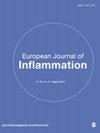产丙酮棒状杆菌肽聚糖:一种抑制巨噬细胞MyD88过表达的新型细菌肽聚糖
IF 0.8
4区 医学
Q4 IMMUNOLOGY
引用次数: 0
摘要
目的:细菌肽聚糖(PGN)是TLR2诱导炎症损伤的必要配体,在病原体侵袭中,如耐甲氧西林金黄色葡萄球菌(MRSA)感染中,通过促进MyD88过表达。CP-PGN是一种来自佐剂细菌的新型PGN,具有抗感染免疫调节作用。本研究旨在阐明CP-PGN对MyD88表达的独特调节作用。方法:与TLR2的其他配体相比,MRSA和病毒在巨噬细胞中建立MyD88的高表达,研究CP-PGN的免疫调节作用。结果:与MRSA衍生的PGN (M-PGN)和TLR2模型激动剂的化学合成Pam3CSK4相比,CP-PGN可以抑制MRSA或Abelson白血病病毒感染的巨噬细胞中MyD88的过表达,并呈时间和剂量依赖性。CP-PGN还能提高未成熟原代巨噬细胞的抗炎IL-10,降低促炎TNF-α。此外,通过ST2825阻断MyD88二聚体形成和si-MyD88下调表达,CP-PGN诱导的IL-10分泌减少最为显著。结论:CP-PGN可通过感染抑制MyD88过表达,调节炎症因子。因此,CP-PGN是TLR2在宿主防御病原体入侵过程中诱导炎症平衡的新型潜在配体。本文章由计算机程序翻译,如有差异,请以英文原文为准。
Corynebacterium pyruviciproducens-peptidoglycan: A novel bacterial peptidoglycan inhibiting overexpression of MyD88 in macrophages
Objectives: Bacterial peptidoglycan (PGN) is an essential ligand of TLR2 inducing inflammatory damage by boosting MyD88 overexpression in pathogen invasion, such as Methicillin-resistant Staphylococcus aureus (MRSA) infection. CP-PGN is a novel PGN from an adjuvant bacterium, displaying anti-infection immune regulation. This study aimed to clarify the unique moderation of MyD88 expression by CP-PGN. Methods: Compared with other ligands of TLR2, high expression of MyD88 in macrophages was established by MRSA and virus to investigate the immunomodulation of CP-PGN. Results: Compared with PGN derived from MRSA (M-PGN) and chemosynthetic Pam3CSK4 of model agonists of TLR2, CP-PGN could inhibit overexpression of MyD88 in a time- and dose-dependent way in infected macrophages by MRSA or Abelson leukemia virus. CP-PGN also promoted more anti-inflammatory IL-10 and less pro-inflammatory TNF-α in immature primary macrophages. Furthermore, IL-10 secretion induced by CP-PGN was reduced most significantly by blocking the dimer formation of MyD88 with ST2825 and lowering down expression by si-MyD88. Conclusion: CP-PGN could inhibit MyD88 overexpression by infection to moderate inflammatory cytokines. Therefore, CP-PGN is a novel potential ligand of TLR2 to induce inflammatory balance in the process of host defense against invading pathogens.
求助全文
通过发布文献求助,成功后即可免费获取论文全文。
去求助
来源期刊
CiteScore
0.90
自引率
0.00%
发文量
54
审稿时长
15 weeks
期刊介绍:
European Journal of Inflammation is a multidisciplinary, peer-reviewed, open access journal covering a wide range of topics in inflammation, including immunology, pathology, pharmacology and related general experimental and clinical research.

 求助内容:
求助内容: 应助结果提醒方式:
应助结果提醒方式:


